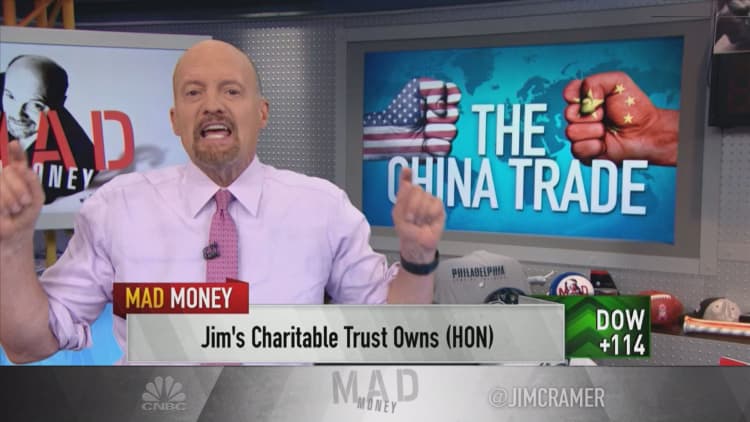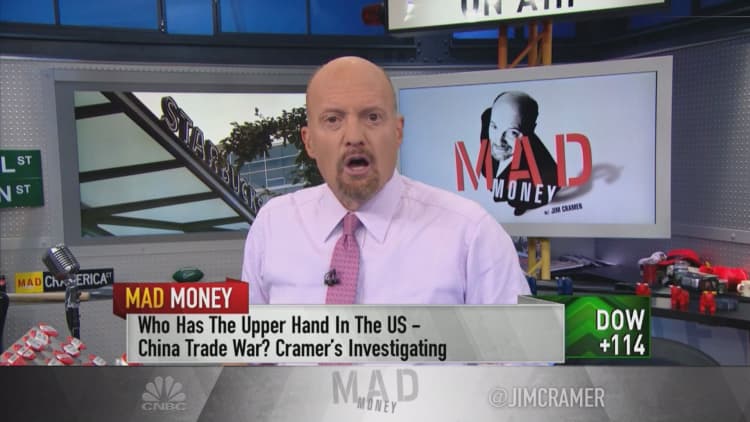
Markets moved higher on Tuesday, leading CNBC's to question how worried investors really are about the U.S.-China trade war.
"Have investors stopped fearing retaliation?" the "Mad Money" host wondered. "Do they think our governments will just make a deal so these tariffs never go into effect? What's the logic here?"
The market's unexpected strength comes after a weekend of escalating tensions between the two countries. On Friday, President Donald Trump told reporters he was "ready to go" with tariffs on an additional $267 billion worth of Chinese goods. Reports surfaced shortly thereafter that China would ask the World Trade Organization to place sanctions on the United States.
But what Cramer found most puzzling was that despite these intensifying exchanges, shares of companies that do a lot of business in China — companies like Honeywell, United Technologies and Emerson Electric — are actually going higher.
The "Mad Money" host recalled his interview with Honeywell Chairman and CEO Darius Adamczyk from last week. In it, Adamczyk said that tariffs would not be "a big mover" for Honeywell because of the company's "local-for-local strategy;" in other words, what's made in China stays in China.
"That's a huge statement when you consider that China accounts for 70 percent of the new Honeywell['s] growth," Cramer said.
He also pointed to United Technologies, a massive industrial conglomerate that sells a large portion of its elevator products into China.
"It's their most important geography by far," Cramer said. "But the company may be breaking itself up into a climate controls business, an aerospace business and the elevators, which is Otis. Maybe China's not big enough to matter?"
And for Emerson, an engineering and manufacturing giant, China has been an integral market for decades.
"Emerson's also very reliant on China for its growth," Cramer said. "If the tariffs were a major concern, this stock would be going much lower, maybe hitting its low, not hitting its all-time high."
Other stocks that have been hurt by trade war fears — with the exception of a few potential losers like Boeing and Caterpillar — have also had a fairly easy time escaping China-related weakness, Cramer said, noting the technology stocks' comeback on Tuesday.
"The stock market tends to be a very good forecasting machine. Right now, with the up 8 percent for the year, it seems to be predicting that the trade war with China is just not that big a deal," the "Mad Money" host said.
"The other possibility? When you look at the strength in our market and the weakness in China's — Shanghai index down nearly 20 percent — these averages might be forecasting that the Chinese government will blink. I've said it before: China has a lot more to lose from this trade war than we do. In the end, that might bring them to the table, even if it makes the Communist Party lose face."
The Shanghai index hit a new 52-week low on Tuesday. Shares of Honeywell, United Technologies and Emerson Electric all traded within a percentage point of their opening prices into Tuesday's close.
WATCH: Cramer on what stocks are saying about the trade war

Disclosure: Cramer's charitable trust owns shares of Honeywell and Emerson Electric.
Questions for Cramer?
Call Cramer: 1-800-743-CNBC
Want to take a deep dive into Cramer's world? Hit him up!
Mad Money Twitter - Jim Cramer Twitter - Facebook - Instagram - Vine
Questions, comments, suggestions for the "Mad Money" website? madcap@cnbc.com



